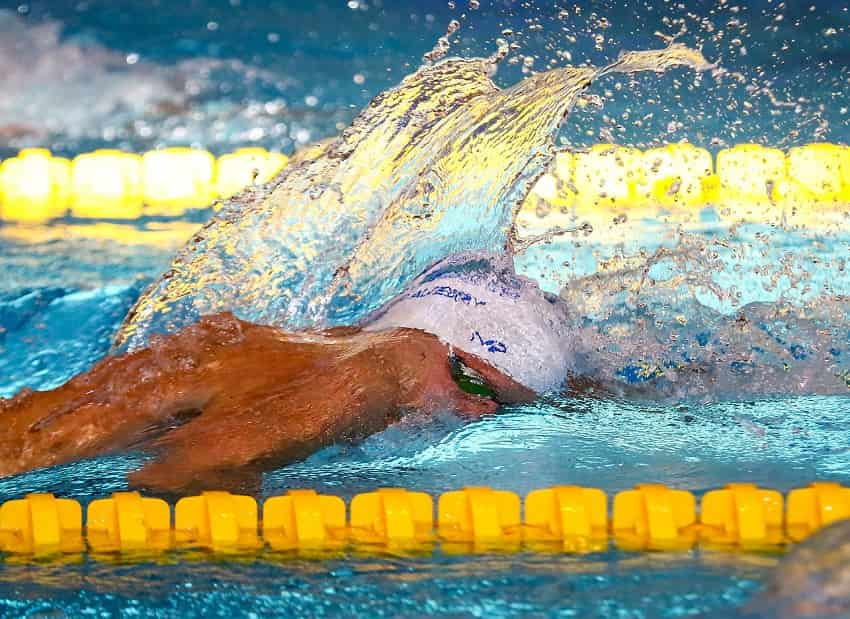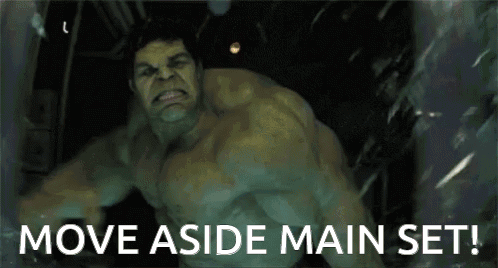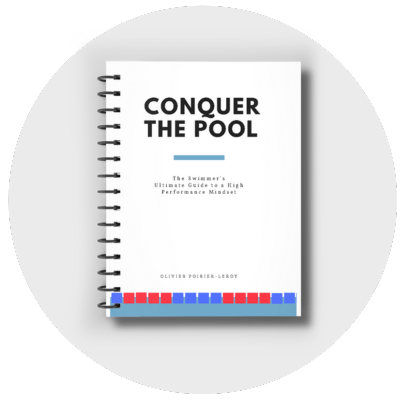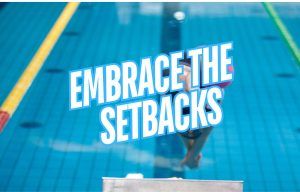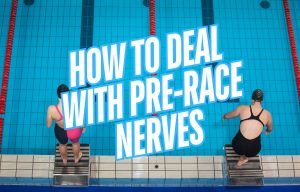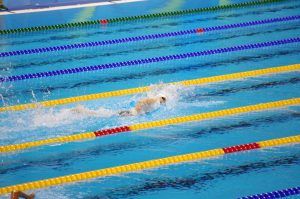Frustrated with not feeling motivated consistently enough? Have big goals, but have a hard time sticking to them because of wobbly motivation? Then read on.
Motivation often seems like it is breaking or making our swimming, doesn’t it?
On days when we are flush to the goggles with motivation, we read through our favorite motivational swim quotes, crash onto the pool deck like the Hulk, ready to take down the main set, flashing the workout on the white board a steely “you’re gonna get it” look.
Something like this:
But then there are the other days…
You know…
The ones where our friend-buddy-pal motivation is literally nowhere to be seen. When it feels like we are dragging a tire around behind us as we walk out onto the pool deck. When the main set looks at us and laughs—“No chance today, champ.”
For those days, here are some truth kernels about what’s causing your motivation to hide behind the couch and refuse to come out.
The Truth About Why You Can’t Get Motivated at Practice
Here’s a bright spot in your dark cloud of feeling unmotivated: Not feeling perpetually motivated doesn’t mean there’s something wrong with you. Athletes make a bigger deal of motivation then they need to at times. Motivation ends up being the thing they blame for their lack of success in the water, while these same athletes lack the clarity of how motivation works and how best to use it.
There are going to be times when it’s a real mental tug-of-war to get your butt down to the pool.
That’s just part of the deal.
Fatigue and sleep deprivation plays a role in how motivated you are going to feel. How stressed out you are that day. Even how hydrated you are can pull the night-shade on your motivation levels.
But if you find that you are not motivated despite having big goals, then there is some trouble shooting we can do.
Motivation isn’t all that complicated.
Motivated swimmers are generally made up in the same way.
They have ownership of what they are doing in the water. They find the daily experience of training to be fun and enjoyable. They like being part of a group that are also chasing greatness. And they relish the opportunity to build competency.
That’s it.
It’s not that they have a more motivating playlist. Or that they are naturally pre-disposed to being more motivated (although, to be fair, some come by it more naturally than others).
They simply check off those things more often than the athletes who we consider lazy and unmotivated.
Now, those four things sound simple. And they somewhat are. But consistently living up to them isn’t so easy.
Here are some ideas for how you can start ramping up your motivation levels in the pool.
Your big goals are actually demotivating.
What? How can that be? My big, dreamy goals are not motivating me?
When we make big, borderline insane goals, we give ourselves something massive to live up to. The only problem is, eventually your effort and progress pale in comparison to what your big dream requires.
The main problem I have with the big, crazy goals is that they require you to be “perfect.” One bad practice throws you off course. One failed set means you are out of the running. Goals should motivate and direct you, not threaten to destroy your motivation if you have the occasional bad practice.
Same goes when you make goals that are too easy.
Easy-peasy goals get boring in a hurry. When we aren’t challenged and pushed, we get disinterested faster than swimming a 25 best stroke with fins and paddles on.
There is a sweet spot with your goals that will keep you motivated, interested, and on track with your swimming. The goal is challenging, but doable given your abilities. It’s not easy, it’s not impossible—it’s the Goldilocks principle at work.
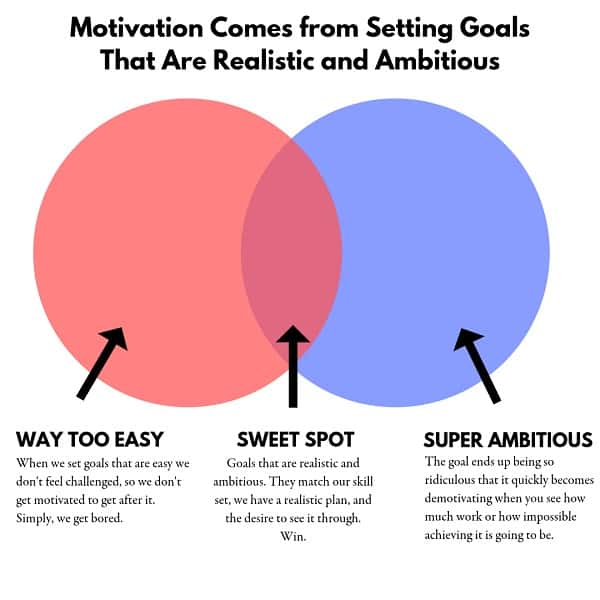
I’m not saying to not dream big. Going big with your ambitions is important. Super important.
But you need to be realistically insane when it comes to the goal and what you are willing to do to achieve it. If you are going to make big goals, make sure you are living up to the process required to achieve it.
Your big goals are the only reason you go to practice each day.
Having a clear idea of what you want to do at the end of the season is nice. But that big goal is fraught with a measure of uncertainty. Especially if your goal is to win a gold medal, qualify for a team, or anything else that banks on how other swimmers perform.
This uncertainty causes us to ride a roller coaster of doubt and uncertainty, energy that is better spent focusing on our process and the things we actually control.
By throwing all your attention and focus at the uncertainty of the outcome, you bypass or ignore all of the other perks and benefits to being a chlorinated athlete.
How to remedy this in just a couple minutes?
Take a sheet of paper and write down the reasons you love this crazy little sport of ours. Hanging out with your friends. Pushing yourself daily. Getting to see what you can do. The comradery of the daily struggle with your teammates.
And so on.
There are plenty of reasons to get motivated to go to practice and have fun working hard that have nothing to do with the scoreboard. This exercise will help you develop a healthier relationship with the sport, one that isn’t only described in terms of seconds and fractions of a second.
And ironically enough, when your relationship with the sport is healthy, motivation to go to practice and work your tail off becomes easier to come by.
You are focusing all your attention on what other swimmers are doing.
I’ve talked a lot about the bear trap that is comparison-making. We all struggle with it at some point.
Swimmers compare themselves to the competition and get discouraged. They compare themselves to where they were last season and get bummed out.
Either way, we take today’s you and compare it to the best of someone else, which is guaranteed to leave you feeling lousy and unmotivated.
The golden rule with comparison-making is this: If it’s not motivating you, if it’s not getting you fired up to go to the pool and smash your practice in the face, don’t.
The environment is making it way harder to get and stay motivated.
Do you share the lane with swimmers who have similar goals? Do you spend time with people who foster healthy lifestyle habits? Do you stay up until 1am Googling random facts about sharks or are you sleeping?
Your environment plays a massive role in how motivated you are on a day to day basis. While writing “Train like a monster today!” on your water bottle might not make you train better every day, it nudges you in that direction. Add enough of these kinds of cues and the environment soon makes excellence and high levels of motivation the default setting with your attitude.
Charge the environment with reminders to be 5% more excellent today:
- Write your goals on a piece of paper and stick it somewhere easy to see.
- Write out a motto or piece of self-talk onto your water bottle.
- Write “Eat like a golden champ today!” on the fridge.
Your environment—from the background on your phone to the swimmers you share a lane with—radiate a thousand signals and cues each day that help dictate how motivated you are.
Instead of trying to overwhelm low motivation signals with sheer willpower, create an environment that encourages motivation and better decisions.
You are using the wrong kind of motivational tactics.
Extrinsic rewards and motivation—money, validation from others, or a steaming hot slice of pizza—can work in a pinch. You better believe if someone puts a slice of melty pizza at the other end of the lane, I will sprint my rear-end off to get my greasy paws on that melted cheese-pile of goodness.
But this kind of motivation isn’t sustainable. (For one thing, you would put on about a million pounds doing 25s fast with a slice of pizza after each one.)
Extrinsic rewards can help in some cases when they foster a sense of competence, but can also backfire, with research finding that extrinsic rewards eventually discourage effort and send motivation to the bottom of the deep end.
Intrinsic rewards, the warm fuzzies you feel when you do a good job or give your best effort, are the ones you can wield more frequently. They are long-lasting, effective, and rely only on yourself, not how others perceive you, rewards you can’t always control, or even times.
Make your goals at practice each about doing your best.
Sounds cliché and maybe even trite but putting forth your best effort each day is the most motivational thing you can do for yourself.
But how do I give my best effort if I am not motivated?
Had a feeling you might ask that!
Motivation isn’t something you have to have in the moments you walk out on the pool deck. You’ve had great workouts before where you weren’t super motivated beforehand, so why is today going to be any different?
If you are waiting to “feel like it” you will likely never get anything done. Make the goal each day getting started. The goal shouldn’t be feeling motivated. The goal is starting.
That’s the biggest secret to being motivated more often. Getting started.
You already know this little grain of truth—how many times have you been ruing the main set, only to hit your stride after the first round? How many times have you gone to workout, convinced that it was going to go poorly, only to have one of the better sessions of the year?
Motivation comes in the doing of something, not from wishing you were motivated (and then mentally clobbering yourself for not feeling motivated, making things worse).
Walk through the door. Commit to starting. Do the little things well. Give yourself a chance to get motivated.
More Stuff Like This:
This Mental Training Workbook Will Help You Swim Like a Rock Star This Season. Confused about mental training? Want to unleash pro mode on your swimming this year? Learn how this mental training workbook will change your mindset and help you pummel your PB’s this season.
Why Change is So Hard in the Pool (and How to Make It Easier). We all want change in some measure—so why is it so dang difficult to make happen? Here’s the reality behind making change that actually sticks in the pool.

